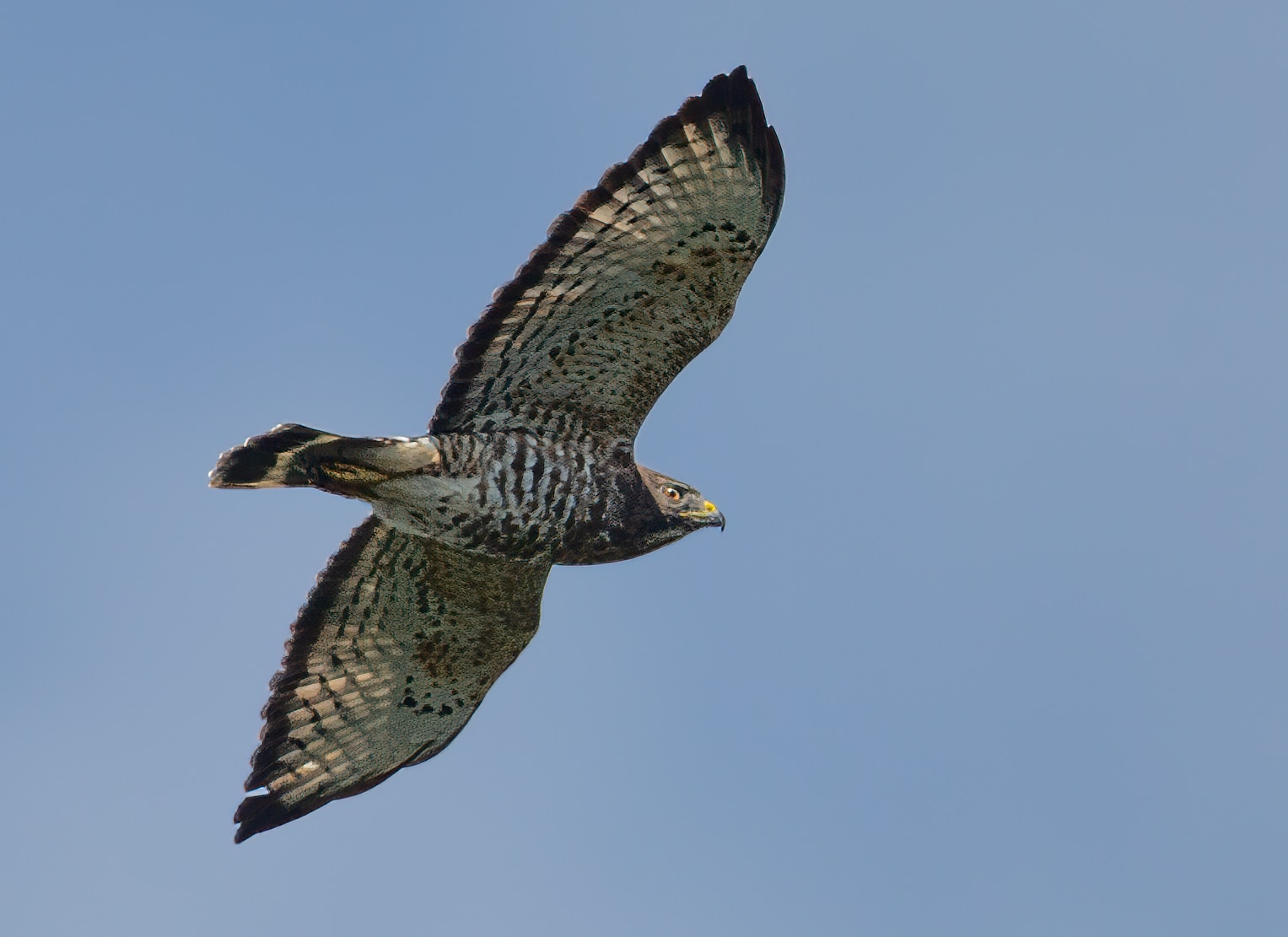
Last Updated on October 31, 2023 12:33 pm
LINVILLE, N.C. – Staff and volunteers at Grandfather Mountain, the not-for-profit nature park run by the Grandfather Mountain Stewardship Foundation, recently participated in Hawk Watch, a vast citizen-science project during the month of September to count and identify the numerous species of raptors making their annual journey to warmer climates.
Raptors are birds of prey, such as hawks, eagles, owls and vultures. The telltale signs of the raptor are sharp talons, a hooked upper bill and keen eyesight. While some raptors remain in place during winter, most will travel south, where food is more abundant.
Visitors had a front-row seat to one of nature’s most stunning spectacles and were invited to join the mountain’s naturalists as they tallied the number of migrating passersby in the sky from viewing locations on Linville Peak and Half Moon Overlook. Grandfather Mountain is one of more than 300 Hawk Watch sites officially designated by the Hawk Migration Association of North America.
This year saw the second-highest tally since 2008, with a total of 6,744 raptors recorded overhead. Broad-winged hawks were the most-counted species. The year with the most birds observed from the park was 2015, when 10,723 were spotted that September.
There were 41 different volunteers who contributed more than 700 hours of service to Hawk Watch 2023.
The busiest day of the count came on Sept. 22, during which 2,482 birds were recorded. The second-busiest day came on Sept. 19, when 2,338 raptors were counted.
“Weather conditions – such as fog, rain, cloud cover – and prevailing winds were definitely in our favor this year,” said John Caveny, director of conservation and education for the Grandfather Mountain Stewardship Foundation.
The raptors opt to take the path of least resistance, which sometimes brings them directly over Grandfather Mountain and other times does not.
“There are a ton of different factors that determine the exact route that birds will take in migration, like the availability of thermals, wind direction and barometric pressure,” Caveny added. “There were certainly days where Hawk Watch sites to our east and to our west saw more birds than us; however, we had a few days where we got the highest number of birds in our region. That is just part of the natural phenomenon and a major part of what makes it exciting – you never know when the big day may actually be.”
Grandfather Mountain is typically a prime spot for viewing this phenomenon because it sits along the eastern escarpment of the Appalachian Mountains, and its rocky peaks generate strong thermal uplifts and allow excellent visibility.
“Another very important factor in this year’s strong numbers is that we had a lot of help from some very dedicated staff and volunteers who, after participating year after year, have become experts at locating birds that are far off and hard to see,” Caveny said. “I am 100 percent certain that without these trained eyes, we would have missed a lot of birds.”
Aside from offering quite a show, Hawk Watch serves an important purpose. The annual counts from Grandfather Mountain and other locations help track hawk populations and migration routes over time and contribute to this growing body of research.
The goal is to accumulate a large set of data over an extended period of time in order for researchers to examine the birds’ migratory patterns and what external factors, such as climate change, may be affecting them. When it comes to conservation projects like this one, long-term data (input from Hawk Watch sites) is key in being able to better understand what issues these species are facing.
To learn more about Hawk Watch at Grandfather Mountain, visit www.grandfather.com/hawk-watch.
To view more data from this year’s Hawk Watch, visit www.hawkcount.org/grandfathermountain.
The nonprofit Grandfather Mountain Stewardship Foundation strives to inspire conservation of the natural world by helping guests explore, understand and value the wonders of Grandfather Mountain. For more information, visit www.grandfather.com.
Hawk Watch 2023_Photo by Dennis Smith: Staff and volunteers at Grandfather Mountain, the not-for-profit nature park run by the Grandfather Mountain Stewardship Foundation, recently participated in Hawk Watch, a vast citizen-science project during the month of September to count and identify the numerous species of raptors making their annual journey to warmer climates. (Photo by Dennis Smith)

Broad-Winged Hawk 2022_Photo by Nancy Smith: This year saw the second-highest tally since 2008, with a total of 6,744 raptors recorded overhead. Broad-winged hawks were the most-counted species. There were 41 different volunteers who contributed more than 700 hours of service to Hawk Watch 2023. Aside from offering quite a show, Hawk Watch serves an important purpose. The annual counts from Grandfather Mountain and other locations help track hawk populations and migration routes over time and contribute to this growing body of research. (Photo by Nancy Smith)




















